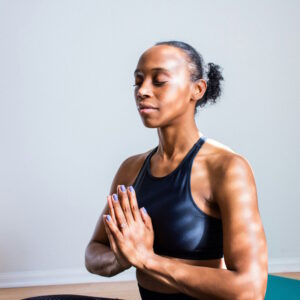
In our fast-paced and often chaotic world, stress has become an almost constant companion for many. The toll it takes on our physical and mental health is well-documented, making it essential to find effective strategies to manage and alleviate stress. Pilates, an exercise system renowned for its holistic approach to well-being, has gained recognition as a powerful tool for stress relief. In this guide, we’ll explore how Pilates can be a valuable asset for managing stress, compare it to yoga in terms of anxiety reduction, examine its impact on cortisol levels, and delve into its potential benefits for individuals dealing with depression and anxiety.
Is Pilates good for stress relief?
Yes, Pilates can be a highly effective means of stress relief, offering numerous benefits that help combat the physical and mental effects of stress:
1. Mind-Body Connection: Pilates encourages a strong mind-body connection, fostering mindfulness and awareness of physical sensations. This heightened awareness can help individuals manage stress by staying present and in tune with their bodies.
2. Controlled Breathing: Pilates incorporates controlled breathing techniques that promote relaxation and reduce stress. Focusing on breath during Pilates practice can have a calming effect on the nervous system.
3. Muscle Tension Reduction: Stress often leads to muscle tension and discomfort. Pilates exercises involve stretching and lengthening, which can alleviate muscle tightness and release physical stress.
4. Increased Blood Flow: Pilates movements stimulate blood flow and circulation, aiding in the release of endorphins, the body’s natural mood lifters. This can help counteract stress-induced feelings of anxiety or low mood.
5. Stress Reduction Hormones: Regular Pilates practice can trigger the release of stress-reduction hormones, such as serotonin and dopamine, promoting a sense of well-being and calm.
6. Restorative Focus: Certain Pilates exercises, particularly those focused on relaxation and stretching, can be inherently restorative, providing a sense of tranquility and stress relief.
Is Pilates or yoga better for anxiety?
Both Pilates and yoga can be effective for reducing anxiety, but they offer slightly different approaches to anxiety management:
1. Pilates: Pilates primarily focuses on physical strength, flexibility, and controlled movement. It offers benefits for anxiety by promoting mindfulness, relaxation through controlled breathing, and muscle tension reduction. Pilates is often more dynamic and strength-oriented than yoga, making it appealing to those who prefer an exercise-based approach to anxiety relief.
2. Yoga: Yoga combines physical postures, breath control, meditation, and relaxation techniques. It provides a holistic approach to anxiety reduction, addressing both the physical and mental aspects of anxiety. Yoga’s emphasis on mindfulness and meditation can be particularly helpful for individuals seeking a deeper mental and emotional connection as part of their anxiety management.
The choice between Pilates and yoga for anxiety management depends on personal preferences and individual needs. Some individuals may benefit from the dynamic, strength-building aspect of Pilates, while others may find the holistic approach of yoga more appealing.
Does Pilates help cortisol levels?
Cortisol is a hormone produced by the body in response to stress, and chronic elevation of cortisol levels can have negative health effects. Pilates can help regulate cortisol levels in several ways:
1. Stress Reduction: By promoting relaxation, mindfulness, and controlled breathing, Pilates can mitigate the body’s stress response. Reduced stress leads to lower cortisol levels.
2. Improved Sleep: Pilates can contribute to better sleep quality. Poor sleep is linked to elevated cortisol levels, so improving sleep patterns through Pilates can help normalize cortisol.
3. Exercise’s Role: Regular exercise, including Pilates, is known to regulate cortisol levels. Physical activity can reduce the body’s stress response, leading to more balanced cortisol production.
4. Endorphin Release: Pilates stimulates the release of endorphins, which act as natural mood stabilizers. Elevated endorphin levels can help counteract the negative effects of cortisol on mood and stress levels.
While Pilates can be an effective component of stress management and cortisol regulation, it’s important to approach stress holistically. A combination of stress-reduction techniques, a healthy diet, regular exercise, and sufficient sleep is generally recommended for maintaining balanced cortisol levels.
Is Pilates good for depression and anxiety?
Pilates can be beneficial for individuals dealing with depression and anxiety as part of a comprehensive approach to mental health and well-being. Here’s how Pilates can contribute:
1. Mindfulness and Body Awareness: Pilates fosters a strong mind-body connection, promoting mindfulness and body awareness. This can help individuals better manage the symptoms of depression and anxiety by staying present and grounded.
2. Stress Reduction: Pilates offers stress relief through controlled breathing, muscle tension reduction, and relaxation techniques. Reduced stress can alleviate symptoms of depression and anxiety.
3. Improved Mood: The release of endorphins during Pilates can elevate mood and combat feelings of sadness and anxiety often associated with depression.
4. Routine and Structure: Establishing a regular Pilates practice can provide structure and routine, which can be particularly helpful for individuals dealing with depression. A consistent exercise routine can improve motivation and overall well-being.
In summary, Pilates is a valuable tool for stress relief, offering a holistic approach that includes mindfulness, controlled breathing, muscle tension reduction, increased blood flow, and the release of stress-reduction hormones. While both Pilates and yoga can be effective for anxiety management, the choice between the two depends on individual preferences. Pilates can help regulate cortisol levels through stress reduction and improved sleep. It can also be a helpful component of a comprehensive approach to managing depression and anxiety, promoting mindfulness, reducing stress, and improving mood. In the pursuit of stress relief and mental well-being, Pilates can play a meaningful role in nurturing peace amidst life’s chaos.